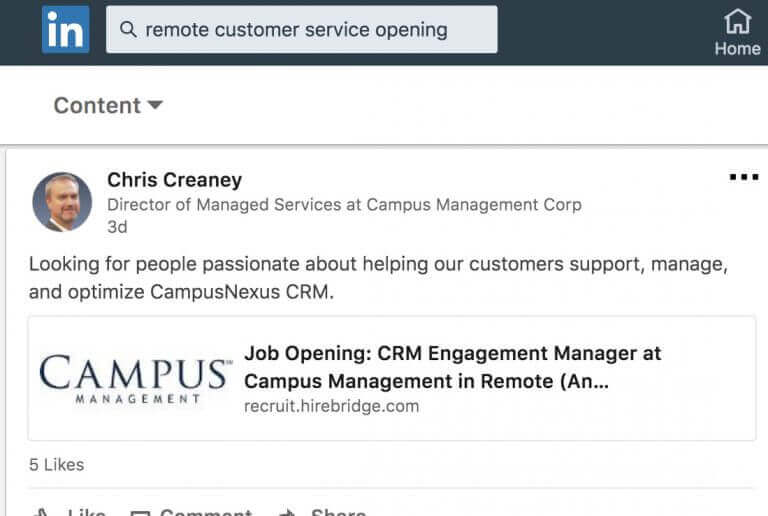Whether you want to make the world your office, need to increase availability to family, or simply feel more productive working in pajamas, transitioning to remote work is an alluring career choice for its work-life flexibility. Before you start setting up your new home office, take some time to develop a remote job search strategy. Finding that perfect telecommute position among thousands of traditional in-office postings can be a headache, so here are 4 top tips on how to find remote jobs.
Vary Your Search Terms
When plugging search queries into your job board of choice, don’t limit yourself to just one term. Try searching “remote,” “telecommute,” “telecommuting,” “work from home,” and even “distributed company.”
On some job boards, a Boolean search might help you search with more efficiency. Boolean searches allow for operators like “AND,” “OR,” and “NOT” that can filter your results on the fly. For example, you might search:
customer service AND remote OR telecommute OR work from home
This might work better on some boards than others. On Indeed, for example, it seems to work with some limitations. Try it out in your favorite job board to see if helps refine your results.
Search for Remote Jobs Listed in Other Cities
Many job boards have a remote location setting or filter in search. Check out the jobs categorized in these sections, but don’t stop there. Not all remote job listings will be designated as such.

For one, many applicant tracking systems automate the process of posting job descriptions to various job boards. When using one of these systems, a human resources rep might not think to change the default location setting before the job description gets published across the web. Therefore, a remote job listing might be inadvertently posted in the city in which the company is headquartered. Search for remote keywords in New York, Chicago, and Los Angeles, or startup hubs like Silicon Valley, Seattle, Portland, Austin et al.
In some cases this could also be an intentional move. A company might be comfortable with a telecommuting employee while still preferring (but not necessarily requiring) someone close by. They might envision periodic meetups or simply prefer the logistics of working in the same time zone.
In either scenario, be sure to periodically search for remote jobs in cities that are not your own.
One unexpected place to find a remote job might be in Oregon. A surprising number of companies seem to accidentally list their telecommute jobs in the rural community aptly named Remote, Oregon, especially on top job site Indeed. If you’ve exhausted your other resources it’s worth plugging “Remote, OR” into the location bar and seeing what comes up.
Use Specialized Remote Job Boards and Aggregators
You should find plenty of remote opportunities on the top job boards and aggregators like Indeed, LinkedIn, Glassdoor, ZipRecruiter, and Google for Jobs, but there are also several job boards specific to work from home jobs. Here are a few worth checking out:
Search Outside of Job Boards
Get a leg up on your job search competitors by finding job listings before they hit popular job boards. One way to do this is to search social media for listings. For example, search LinkedIn or Twitter content to find companies or users posting about new openings.

While you’re at it, make sure your social media profiles are ready for recruiter review. With Jobscan, you can even optimize your LinkedIn profile to attract recruiters looking for remote workers with your specialty.
Target Top “Remote-Friendly” Employers
It’s always smart to maintain a list of target companies when job hunting and it can be especially helpful in a remote job search. There are whole companies that rely on a remote workforce and others that are known to be telecommute-friendly. Here are a couple lists to get you started:
FlexJobs: Top Companies with Remote Jobs
- VIPKID
- Appen
- Conduent
- Rev
- Liveops
- TTEC
- Amazon
- SYKES
- Dell
- Working Solutions
See full list
GitHub Crowdsourced List of “Companies with ‘Remote DNA'”
Random Selections (full list is alphabetized)
These tips should reveal a few listings worth applying to. The next step is to perfectly tailor your resume for the job. Learn how Jobscan has helped automate the process in this short video:

















